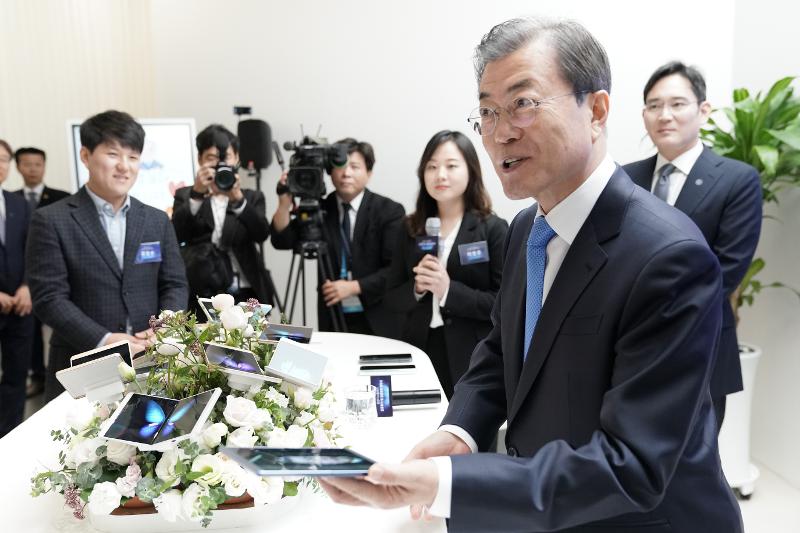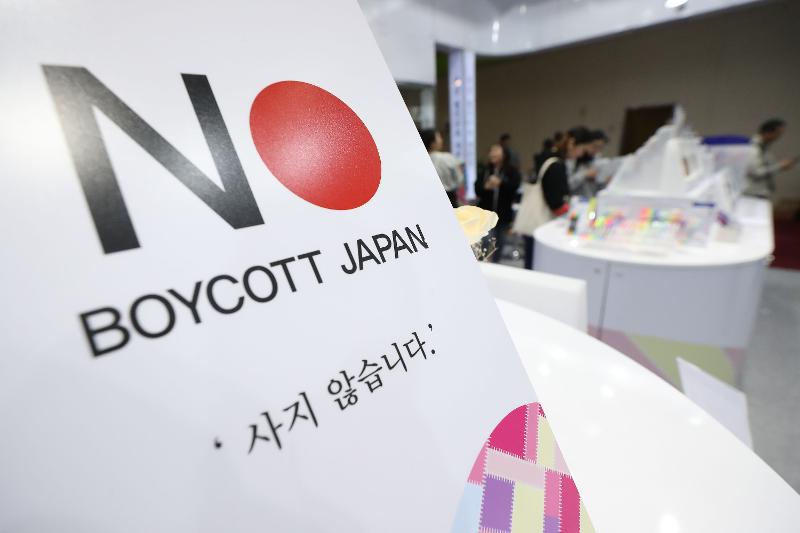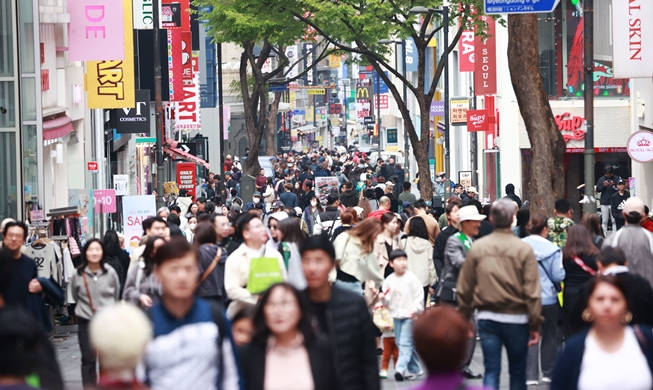-
 Korea.net's 24-hour YouTube channel
Korea.net's 24-hour YouTube channel- NEWS FOCUS
- ABOUT KOREA
- EVENTS
- RESOURCES
- GOVERNMENT
- ABOUT US

July 4 marks the first anniversary of Japan's imposition of export curbs on three key materials to Korea, and despite initial fears, Korea turned this potential crisis into an opportunity. The picture shows President Moon Jae-in on Oct. 10 last year touring Samsung Electronics' display panel factory in Asan, Chungcheongnam-do Province.
By Xu Aiying and Lee Hana
Photos = Yonhap News
SK Materials on June 17 began the mass production of 99.999% pure hydrogen fluoride gas at its factories in Yeongju, Gyeongsangbuk-do Province. This marked the first time for Korea to localize production of this material, as the country had been completely dependent on overseas suppliers before.
This milestone gained more significance coming just a year after Korea began the process of gaining technological independence following Japan's decision to restrict exports of three key materials to Korea.
July 4 marks the first anniversary of Japan's imposition of export curbs on Korea for hydrogen fluoride, photoresist and fluorinated polyimides. The Korean semiconductor and display industries used to import 90% of these materials from Japan.
After the sanctions were announced, fears initially arose that major corporations like Samsung Electronics, SK Hynix and LG Display would take a direct hit; instead, they have put up a good defense. The nation's success in localizing the production of key materials, parts and equipment and gaining self-reliance in the supply chain have led the government to call the sanctions a blessing in disguise.
On the contrary, Japan's export curbs have had a boomerang effect on select Japanese companies, striking a severe blow to suppliers in Korea's neighboring country.
Localization boosts self-reliance
According to a July 1 report by the Korea International Trade Association (KITA) on import trends for the three restricted substances and strategic materials less reliant on Japanese suppliers, Korea suffered minor setbacks in the supply and demand of the restricted materials.
From July last year to May this year, the nation's reliance on imports for hydrogen fluoride and photoresist used to manufacture semiconductors fell 33 and 6 percentage points, respectively, from the previous year. Imports over the 11-month period were diverted to countries like Taiwan, China and Belgium, while the use of domestically produced materials was expanded.
Since October last year, LG Display has made in Korea all of its liquid hydrogen fluoride used to make display panels. SK Materials has invested KRW 40 billion in the production of 500,000 gallons of photoresist per year.
The country also began the process of localized output of fluorinated polyimide, which is used to make foldable smartphones. Last year, Kolon Industries set up a factory in Gumi, Gyeongsangbuk-do Province, to begin domestic production of this material. SKC also set up a facility in Jincheon, Chungcheongbuk-do Province, and began testing with an output target of a million sqm per year.
Korea's reliance on Japan for fluorinated polyimide remains at 90%, but localization efforts began well before the export restrictions set in. Thus no immediate setbacks in supply and demand were seen during this period.
President Moon Jae-in on June 29 held a Cabinet meeting to mark the first anniversary of Japan's trade sanctions on Korea. "We have unwaveringly tackled Japan's provocative measures head on, and turned it into a new opportunity instead," he said.

One year after Japan's imposition of trade sanctions on Korea, signs saying "Boycott Japan" are common at stores and other venues across the country.
Boomerang effect on Japanese companies
Ironically, Japan's sanctions on Korea have dealt a huge blow to the country's automotive and liquor industries thanks to a nationwide boycott on Japanese products by Korean consumers. The Korea Automobile Importers & Distributors Association said sales of Japanese cars from January through May this year reached 7,308 units, down 62.6% from the same period last year.
Japanese beer, once a steady seller in Korea, has disappeared from the rankings. The Korea Customs Service said imports of such brews in this year's first five months fell 91% from the same period last year.
The Japanese media said their government's export restrictions have hurt Japanese companies more than Korean.
On July 2, the Japanese daily Nishinippon Shimbun posted a feature on the one-year anniversary of the sanctions headlined "Korea hastens escape from Japan via localization and boycotts."
"The boycotting of Japanese goods is casting a shadow on Japanese companies," it said, adding, "Though the Japanese government denies it, the Korean public has taken the export curbs as economic retaliation for the (Korean Supreme Court) verdict on Korean forced workers, and has boycotted Japanese beer and cars, resulting in big losses."
Another Japanese newspaper, The Asahi Shimbun, on the same day ran the article "Export restrictions on Korea, year of no winners: Japanese companies take blow, costs rise for Korea as it moves to self-reliance."
The Korean government and companies have adapted well to the trade restrictions, but one expert advises preparation for further sanctions from Japan.
"As a result of our companies and our government working together to localize the production of key materials and diversify our imports, no setbacks occurred in supply and demand as sought by the Japanese side," said KITA researcher Hong Ji-sang.
"Given Korea's complaint filed with the World Trade Organization and the Japanese government's liquidation of assets of Japanese companies found guilty of war crimes, the possibility of further export curbs has been mentioned. We should be prepared for uncertainty in the supply chain."
xuaiy@korea.kr
Most popular
- First hearing-impaired K-pop act hopes for 'barrier-free world'
- 'Mad Max' director impressed by 'cinema-literate' Korean viewers
- Romanian presidential couple visits national cemetery
- 'Korean mythology is just as wonderful as Greek and Roman'
- Hit drama 'Beef' wins awards from 3 major Hollywood guilds













